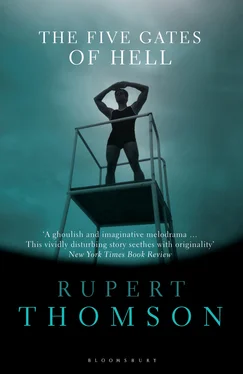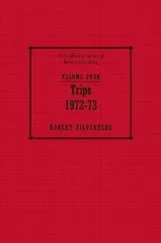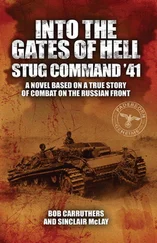Rupert Thomson - The Five Gates of Hell
Здесь есть возможность читать онлайн «Rupert Thomson - The Five Gates of Hell» весь текст электронной книги совершенно бесплатно (целиком полную версию без сокращений). В некоторых случаях можно слушать аудио, скачать через торрент в формате fb2 и присутствует краткое содержание. Год выпуска: 2012, Издательство: Bloomsbury UK, Жанр: Современная проза, на английском языке. Описание произведения, (предисловие) а так же отзывы посетителей доступны на портале библиотеки ЛибКат.
- Название:The Five Gates of Hell
- Автор:
- Издательство:Bloomsbury UK
- Жанр:
- Год:2012
- ISBN:нет данных
- Рейтинг книги:3 / 5. Голосов: 1
-
Избранное:Добавить в избранное
- Отзывы:
-
Ваша оценка:
- 60
- 1
- 2
- 3
- 4
- 5
The Five Gates of Hell: краткое содержание, описание и аннотация
Предлагаем к чтению аннотацию, описание, краткое содержание или предисловие (зависит от того, что написал сам автор книги «The Five Gates of Hell»). Если вы не нашли необходимую информацию о книге — напишите в комментариях, мы постараемся отыскать её.
The Five Gates of Hell — читать онлайн бесплатно полную книгу (весь текст) целиком
Ниже представлен текст книги, разбитый по страницам. Система сохранения места последней прочитанной страницы, позволяет с удобством читать онлайн бесплатно книгу «The Five Gates of Hell», без необходимости каждый раз заново искать на чём Вы остановились. Поставьте закладку, и сможете в любой момент перейти на страницу, на которой закончили чтение.
Интервал:
Закладка:
He drove at a steady thirty-five; if anyone was following him, he would lull them into a false sense of security. When he reached Highway 1 he turned north. It was rush-hour. The air was fogged and glittery with exhaust. As he passed the Butterfield turn-off, the traffic slowed to a standstill and, just for a moment, Jed felt alone; just for a moment he wished that he too was leaving work after a hard day, that he too was heading for a cocktail and dinner in some comfortable house in the northern suburbs.
Then, as the traffic picked up speed and distances began to open between the cars, the sign appeared. Not green like the highway signs, but black and white. Discreet. Innocuous. STATE ABATTOIRS 1 MILE. Jed stamped on the gas and cut into the exit lane, his speed close to fifty now. This was the moment of acceleration, this was the cloud of ink. Down off the highway, round in a circle, under an overpass, and then he was slamming down the narrow road that led to the abattoirs: fifty, sixty, sixty-five. The mirror was empty. Two clangs as he cleared the metal cattle grilles. He swung left into an alley. Pipes coiled overhead, white steam gushed from vents. A sweet smell like beaten egg. A smell that sweetened and decayed. He saw row after row of animal hides slung over rails in an open barn.
The alley fed into a concrete yard. His wheel slithered on mud and straw. This must be where the animals were unloaded. He took a wood ramp that led down past a slaughterhouse and sent his car twisting and rocking along a dirt track. The buildings were behind him now. There were ditches on either side and stands of yellow weeds. Ahead of him, through the windshield, he could see a thin blue strip, a forgotten piece of the harbour. He gunned the car up a steep bank and on to a disused railway. His tyres crackled on chips of stone. In front of him was an old iron swing-bridge. A sign whispered DANGER in small red letters. The sign amused him. Danger was relative.
Not many people knew about the railway. If you didn’t know, and you consulted a map of the city, you could be forgiven for thinking that the line was still being used. On the map, the abattoirs looked like a dead end. To anyone following him, this detour of his would seem like a serious mistake — the result, possibly, of panic. That was the beauty of the manoeuvre. By the time they realised that the mistake was theirs, it would be too late.
He drove slowly over the bridge, the metal wincing under the weight of the car. Then down off the bridge, over wasteland, through the switchback streets of Venus. Down again, into the darkness of the harbour tunnel. In twenty minutes the Towers of Remembrance rose in his windshield. He checked his mirror. Still empty. He was seaweed in seaweed, rock on rock. They’d never find him now.
The Suit of Bones
Nathan heard the stairs creak, the front door slam. He reached the window in time to see Harriet climb into her car. She was wearing a dark coat, the same coat she wore to the funeral. Her face showed nothing. A sealed envelope. Her scarlet lips set hard, like wax.
It was Wednesday morning. He sat at the kitchen table drinking coffee. Tell me something. Do you like this city? Her threats stood around in his head like jailers with bunches of keys. I could make things difficult. The day before he’d asked Dad’s lawyer if it was possible to speed up the handling of the probate. Dad’s lawyer had given him a glance that barely cleared the rims of his spectacles. ‘There are very good reasons,’ he said, ‘why the law moves as slowly as it does.’ The fan turning on its long neck. The wall the colour of soiled shirt collars.
Nathan lifted his eyes from the table. Clouds gathered above the hills and the garden darkened. He saw the rain come swirling out of the sky. He watched the drops crawl down the window. Another six weeks, the lawyer had said. Minimum.
Morning tipped over into afternoon and still he’d done nothing. He moved to the lounge and stood with the french windows open and listened to the rain on the surface of the pool. He remembered days like this when he was young. They used to sit at the kitchen table and paint on sheets of shiny brown paper. Though he tried to paint blue skies, they always came out muddy. When he complained, Dad said, ‘Look at George, it doesn’t bother her.’ Of course it didn’t bother her. She never put any sky in her pictures, did she? She just left big patches of brown everywhere. If you asked her what the patches were, she’d say, It’s brown things. Brown things? It’s earth, she’d say. It’s a table. I don’t know. It’s dogs. She would always have an answer. She could always find a way round things.
He closed the french windows and turned back into the room. There was something he’d been meaning to do and he should do it now, while he was alone, with no excuses. He climbed the stairs and walked into the bedroom that had once been Dad’s and was now his. He took a key out of the bedside-table drawer and unlocked the closet. Inside were two rows of clothes. Old suits, mostly. Blazers, coats. Frayed at the cuffs and buttons gone. Epaulettes of dust. This part would be all right, he realised. If Dad had worn these clothes at all, he’d worn them before Nathan’s memory began; they preceded him and wouldn’t hurt. He emptied the closet of everything except the wire hangers and the sheets of Christmas paper. All he kept back were two suits and a jacket. The suits were for him. The jacket was for Georgia. He thought she might like it. It was brown.
The airing cupboard next. Here were the familiar parts of Dad’s wardrobe. Here, for instance, was the blue cardigan. Nathan lifted it out and touched it to his nose. It smelt so clean and warm, of talcum and vanilla, of his father. This was the cardigan Dad used to wear in bed. This was the cardigan he’d worn when he drank beer on the bottom of the sea. His face buried in the blue wool, Nathan thought of the nights he’d rubbed Dad’s back for him, that peculiar blend of smells, skin and eucalyptus oil, he could hear Dad’s voice rising drowsy from the pillows: ‘A bit further down, a bit further, yes, that’s it, that’s perfect.’
He looked at the clothes arranged in such neat piles in the cupboard, then he looked down at the clothes already packed into boxes at his feet, already creased and growing cold. He had to look away, through air that seemed warped. He folded the blue cardigan, put it back in the cupboard. He put the heels of his hands in his eyes and pressed. The rest of the clothes he sorted briskly, mechanically, as if they belonged to a stranger. He left no room for thoughts to start.
When the airing cupboard was empty, he dragged the boxes to the top of the stairs. He looked out of the landing window. Brown-paper skies and big silver raindrops sliding down the telegraph wires. No view of the harbour or the city, no sense of the time of day.
He reversed the car out of the garage and round to the front door, then he carried the boxes down the stairs and out to the porch, and loaded them into the trunk. At the gate he had to brake and wait for a car to pass. It was then that he noticed the man standing outside their house. The man was wearing a grey suit and holding a large black umbrella. Something told Nathan that the man had been standing there for quite a while. He couldn’t be sure, the rain was falling harder now, jumping back off the sidewalk, it was like looking through smoke, but he thought he recognised the man. In that same moment the man realised that Nathan had seen him. One of his shoulders twitched. He spun round and hurried away. It must be someone who’s heard about the death, Nathan thought. Another coffin chaser.
In ten minutes he was parking outside the local charity store. A sign hung in the window: CLOSED. He took his hands off the wheel, leaned his head back against the seat. He hadn’t expected this. It was more than dismay that he felt now. It was some slow disintegration; he felt as if he was gradually being crushed in someone’s fist. He couldn’t face taking the clothes back home again. He’d have to leave them on the doorstep and hope they were still there in the morning. He hated doing it, but he could think of no alternative.
Читать дальшеИнтервал:
Закладка:
Похожие книги на «The Five Gates of Hell»
Представляем Вашему вниманию похожие книги на «The Five Gates of Hell» списком для выбора. Мы отобрали схожую по названию и смыслу литературу в надежде предоставить читателям больше вариантов отыскать новые, интересные, ещё непрочитанные произведения.
Обсуждение, отзывы о книге «The Five Gates of Hell» и просто собственные мнения читателей. Оставьте ваши комментарии, напишите, что Вы думаете о произведении, его смысле или главных героях. Укажите что конкретно понравилось, а что нет, и почему Вы так считаете.












